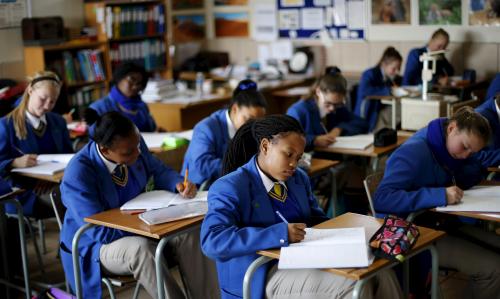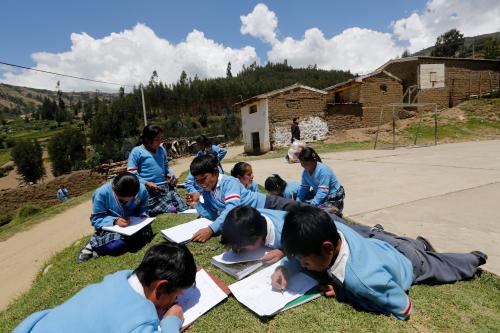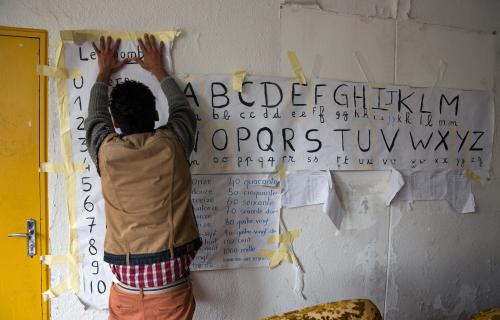This blog is a summary of our new report “Learning Champions: How 15 countries, cities, and provinces came together to rethink learning assessment,” which can be downloaded here.
Since the United Nations Member States officially adopted the Sustainable Development Goals (SDGs) in 2015, one of the major narratives in global development has centered on enhancing the capacity of countries to carry out the reforms necessary to achieve these ambitious goals. This is especially true for education, where an estimated 6 out of 10 children and adolescents worldwide are not learning the basics in reading and mathematics. If these trends persist, less than 10 percent of young people in low-income countries will achieve basic secondary skills required for success after secondary education by 2030, when SDG 4 is aspired to be met.
Even if students can master these basic skills, many skills demanded for work and life in the 21st century—such as critical thinking and collaboration—are even scarcer. Although countries the world over are moving toward a 21st century education in their policies, no country is yet an expert on how to provide it. Between 2012 and 2016, the Learning Metrics Task Force (LMTF) shed light on the skills needed for success in the 21st century, as well as how to measure those skills. This included experimenting with country-led approaches to reforming education systems through its Learning Champions initiative.
The Learning Champions were a group of 15 countries, provinces, and cities (Botswana; the City of Bogotá, Colombia; the City of Buenos Aires, Argentina; Ethiopia; Kenya; Kyrgyz Republic; Nepal; Ontario, Canada; Pakistan; Palestine; Rwanda; Senegal; Sudan; Tunisia; and Zambia) that came together to experiment with LMTF recommendations and to develop strategies for improving their education systems. Some Learning Champions applied because their existing assessments showed low learning levels, and they needed to get a clearer picture to ascertain the underlying causes. Others joined because they lacked the ability to measure learning across a broad set of domains, and still others participated because they wanted to prevent their assessment systems from further increasing inequities in education and society. Unlike many projects in which a donor will require specific activities of a country within a fixed project, the Learning Champions initiative operated as a “project-in-reverse” by asking countries to bring together their own network of stakeholders and identify for themselves what aspects of assessment appeared to be missing from their systems. The Learning Champions then designed new strategies or identified existing programs to address those gaps, and the LMTF supported these strategies through knowledge sharing, modest technical assistance, supporting networks between Learning Champions and LMTF members, and convening face-to-face conferences to share goals and learnings. While each Learning Champion focused on a unique set of issues, some of the common themes of the Learning Champions’ activities were:
- Measuring across the breadth of learning. Many of the participants wanted to devise strategies for authentically measuring learning across multiple learning domains, not just traditional academic subjects.
- Continuously assessing learning. Countries were especially interested in learning how to use assessment for teaching and learning, not merely to pass/fail students.
- Focusing on foundational learning. Participants commonly focused on early childhood education and early grades in primary school.
- Improving dissemination of data. Participants acknowledged the need to better share data from existing learning assessments so they can be used to improve teaching and learning.
Although the initiative officially ended in 2016, the LMTF Secretariat at Brookings kept in touch with Learning Champions and recently published a report summarizing the project and its outcomes. The primary lessons the LMTF learned from the initiative were:
- Start small but think big. Many Learning Champions began with a small pilot with the intention of eventual scaling.
- Engage teachers. Several countries found their activities to be enhanced through engaging teachers in the design, implementation, and dissemination of learning assessment, whether through formal partnerships with unions or ad hoc workshops.
- Convene a network. Nearly all Learning Champions convened a broad network within their jurisdiction, often getting stakeholders together who had never before come to the same table.
- Allocate sufficient and consistent resources. Because the LMTF did not provide direct funding to the Learning Champions, countries able to leverage funding on their own tended to be better able to sustain the gains made during the initiative.
The Learning Champions experience did not bring the participants all the way to where they need to be in regard to improving learning. Sustaining a high-quality learning assessment system that informs improvements to learning requires more intensive technical development and financial resources. Now that the Learning Champions initiative is finished, the participants have been working to expand the set of competencies on which their education system focuses. They are working across their regions to build a critical mass of expertise in assessment so that they do not always have to rely on international experts. They are looking for ways to use the expertise in their examinations councils and use it to help improve student learning before the students sit for an exam. Providing a thinkspace for countries to develop plans and experiment with models appears to have been a welcome change from the traditional “project” approach, and has attracted new funding to several of the Learning Champions’ work.
Read the full report here.






Commentary
15 countries and cities gathered to rethink education assessment systems—this is what we learned
February 13, 2018